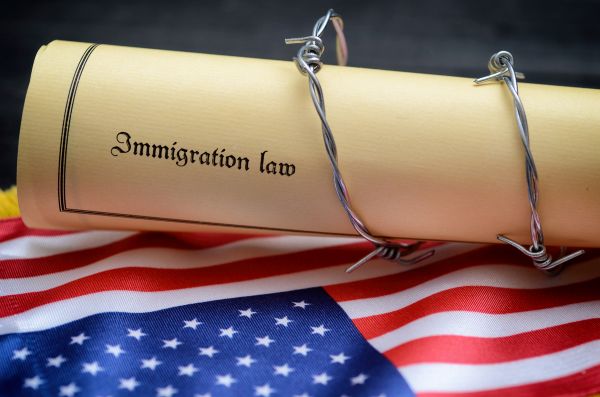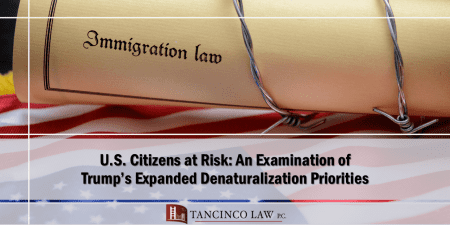In an effort to advance Trump’s policy objectives on immigration, the Department of Justice issued a memorandum/directive to all government attorneys of the civil division of the department to prioritize certain cases for investigation and appropriate action.

The Department of Justice’s June 11, 2025 memorandum (DOJ Memo) outlined five enforcement priorities, with the most controversial being the last: Denaturalization. The Department of Homeland Security is not the only agency tasked with enforcing immigration law against individuals in the United States who are present in unlawful status; the Department of Justice is now also poised to strip certain U.S. citizens of their citizenship status.
Civil or Criminal Denaturalization
Citizenship through naturalization if obtained illegally may be revoked by the government through the process of denaturalization either through a criminal or civil proceedings. The legal grounds for civil denaturalization may be found in INA Section 340(a) where it states that naturalization may be revoked for having illegally procured citizenship or by concealment of a material fact or by willful misrepresentation.
Criminal revocation of citizenship is found in 18 USC § 1425 for naturalization fraud. Citizenship is revoked after conviction for procuring or attempting to procure the naturalization of anyone contrary to law.
The DOJ Memo refers to prioritizing civil denaturalization and has expanded the criteria for those who are subject to denaturalization. In addition, the government had wide discretion based on the DOJ Memo to decide on who to denaturalize.
Concealment of a Material Fact (Example Cases)
To become a naturalized citizen, an applicant generally needs to have been a lawful permanent resident for at least three or five years before applying. However, if an individual obtained permanent residency through fraudulent misrepresentation and later naturalized, this could be grounds for denaturalization. In simpler terms, if someone lied to get their green card and then used that fraudulent green card to become a citizen, their citizenship could be revoked through denaturalization.
An example to illustrate is the case of “John.” In 1991, John was petitioned by his green card holder parent as a single adult son and was granted an immigrant visa. Unknown to his petitioner, John was already married to his long time girlfriend in 1990. He concealed this material fact to the U.S. consular officer during his interview and at the time of entry. After five years he applied and was granted U.S. citizenship. He did not reveal about his prior marriage but instead re-married his spouse after getting his citizenship. If through government investigation, the prior marriage of John is discovered, he will be subjected to naturalization under INA Section 340.
Sometimes concealment of certain matters may not be material in naturalization proceedings but may have adverse effects as well. For example, being arrested for a misdemeanor which typically will not affect the grant of lawful permanent resident status but an immigration examiner may rule this as not having met the good moral character eligibility criteria. Under the DOJ Memo, if the naturalized citizen is investigated by the DOJ attorney and using the latter’s wide discretion, a denaturalization proceeding may be initiated.
Expanded Criteria for Denaturalization
There are 10 categories of priorities for denaturalization enumerated in the DOJ Memo. We will examine a few of them:
Potentially Dangerous. The DOJ memo mentions cases against individuals who pose a “potential” danger to national security as possible subject to denaturalization. There is no definition of who is the potential danger to national security. This may be the case of a naturalized U.S. citizen who may have expressed a political opinion not intended to be a danger to national security but interpreted by the DOJ attorney as “potentially” dangerous to national security, thus, possibly a denaturalization may be initiated in this case.
Fraud Against Private Individuals or Entities. These are cases against individuals who committed fraud against private individuals, funds or corporations. What type of fraud does this cover? What is the extent of the fraud against a private individual or entity that may be subject of a denaturalization. Usually denaturalization focuses on fraud committed on the naturalization application or in obtaining lawful permanent resident. However, this represents an unchartered territory where fraud against an individual or a non immigration related fraud could be a subject of a denaturalization investigation.
Financial Fraud. Cases against individuals who engaged in various forms of financial fraud against the United States (including Paycheck Protection Program (“PPP”) loan fraud, and Medicaid/Medicare fraud may be subjected to denaturalization investigation.. Naturalized U.S. citizens who fraudulently applied for the PPP during the pandemic may fall under this category. Medicaid or medicare fraud is a criminal offense and is now specifically mentioned as triggering a denaturalization proceedings.
Pending Criminal Charges. Cases referred by the U.S. Attorney’s Office or in connection with “pending” criminal charges, if those charges do not fit within one of the other priorities is another new criterion on denaturalization. Under this category, even if there is no criminal conviction and it so happens that the naturalized U.S. citizen has a “pending’ criminal charge a denaturalization case may be initiated. But what type of pending criminal charge falls under this category is also not clear.
Catch All Provision. Perhaps the most unsettling criterion for denaturalization is what many refer to as the “catch-all” provision. This broad language, as outlined in the DOJ Memo, states that the Civil Division can pursue “any other cases… that the Division determines to be ‘sufficiently important to pursue.'” The lack of clear parameters for what constitutes “sufficiently important” grants the government significant discretion. Essentially, this provision could allow the government to initiate denaturalization proceedings against any U.S. citizen it deems “important” enough to target. Such vague criteria raise concerns about potential interpretations that could shift with different administrations’ policies.
Denaturalization Process
Once an immigrant is identified for investigation by the government for purposes of denaturalization, the case will be filed with the federal district court having jurisdiction over the residence of the immigrant being stripped of citizenship. When the case is filed with the court the naturalized U.S. citizen may present evidence to avoid denaturalization. Note that this is a judicial process and only a federal judge may strip one of U.S. citizenship. If a citizen is denaturalized, the individual will revert back to his/her prior immigration status and most likely be put in removal proceedings. Whether or not he will be deported depends on available relief or waivers.
What to Do
Given that denaturalization is now a priority for action as directed by the Department of Justice, it is crucial for naturalized citizens to understand their potential vulnerability. If you believe you might fall into any of the categories outlined in recent DOJ Memo, we strongly advise the following:
First, revisit and re-examine your past naturalization application and all supporting documentation. Look for any discrepancies, omissions, or misrepresentations, however unintentional, that could be misconstrued under heightened scrutiny.
Second, seek immediate and competent legal counsel. This is a default and necessary step to protect your rights. An experienced immigration attorney can assess your specific case, come up with a risk assessment and advise you on your next best course of action.
Finally, should denaturalization proceedings be initiated, prepare and raise defenses in federal court. In the unfortunate event that denaturalization is ordered, explore all applicable waivers or applicable immigration relief to avoid potential removal from the United States. Taking proactive steps now is essential to protecting your citizenship.
If you believe that you fall into any of the categories of those who might be affected by this denaturalization effort of USCIS, it will be best to revisit and re-examine your naturalization application, have your case assessed by competent legal counsel. And, if there is a possibility of denaturalization, prepare to defend yourself in the federal court and, in the worst case scenario, explore applicable waivers or defenses to avoid removal.
(Atty. Lourdes Tancinco is an immigration attorney and immigrant rights advocate based in the San Francisco Bay area and a partner at the Tancinco Law P.C., law firm established since 1992. She is also a producer/host of Pusong Pinoy sa Amerika, an immigration law informational show aired on GMA Pinoy TV. She may be reached at law@tancinco.com, www.tancinco.com, facebook/tancincolaw, or text/call 1-415-397-0808)


